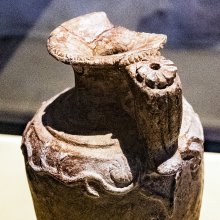Drava, Dravā, Drāva: 21 definitions
Introduction:
Drava means something in Buddhism, Pali, Hinduism, Sanskrit, the history of ancient India, Marathi, Hindi. If you want to know the exact meaning, history, etymology or English translation of this term then check out the descriptions on this page. Add your comment or reference to a book if you want to contribute to this summary article.
Drava has 20 English definitions available.
Alternative spellings of this word include Drav.
Images (photo gallery)
Languages of India and abroad
Sanskrit dictionary
[Deutsch Wörterbuch]
Source: Cologne Digital Sanskrit Dictionaries: Böhtlingk and Roth Grosses Petersburger WörterbuchDrava (द्रव):—(von 1. dru)
1) adj. a) laufend, vom Rosse [Ṛgveda 4, 40, 2.] — b) laufend, flüssig; subst. Flüssigkeit, Saft [?(Amarakoṣa 3, 4, 30, 229. Hemacandra’s Abhidhānacintāmaṇi 638. Anekārthasaṃgraha 2, 523. Medinīkoṣa v. 9. fg.) Kāṭhaka-Recension 27, 7.] yadaṇḍamadhye skannaṃ tu dravamāsītsamāhitam [Harivaṃśa 12333.] [Suśruta 1, 8, 21. 33, 5. 78, 14. 169, 8. 194, 9. 2, 350, 15. 436, 9. 443, 18.] [Mṛcchakaṭikā 92, 6.] [Raghuvaṃśa 7, 7.] [Kumārasaṃbhava 2, 11.] dravāṇāṃ caiva sarveṣāṃ śuddhirutpavanaṃ smṛtam [Manu’s Gesetzbuch 5, 115.] dravāṇāṃ caiva sarveṣāṃ peyānāmāpa uttamāḥ [Mahābhārata 14, 1221.] mūrti [Pāṇini’s acht Bücher 6, 1, 24.] [Suśruta 2, 175, 10.] adravapāyin [1, 239, 8.] samūha [313, 5.] annaṃ dravaprāyam [2, 46, 18.] samātuluṅga [326, 10.] kāśmīra [Bhartṛhari 1, 48.] amṛta [Bhāgavatapurāṇa 1, 1, 3. 4, 23, 16.] dravasvacchāntarātman [Hitopadeśa I, 93.] Vgl. godrava . —
2) m. nom. act. [Pāṇini’s acht Bücher 3, 3, 27,] [Scholiast] a) Lauf, rasche Rewegung; Flucht; = gati, vega, pradrāva, vidrava [Amarakoṣa 2, 8, 2, 79.] [Hemacandra’s Abhidhānacintāmaṇi 802.] [Hemacandra’s Anekārthasaṃgraha] [Medinīkoṣa] [VIŚVA] und [Śabdaratnāvalī im Śabdakalpadruma] māruta [Harivaṃśa 11430.] daityadravakara [12567.] — b) das Herumlaufen, Spiel, Scherz [Amarakoṣa 1, 1, 7, 32.] [Hemacandra’s Abhidhānacintāmaṇi 555.] [Hemacandra’s Anekārthasaṃgraha] [Medinīkoṣa] — c) das Flüssigsein, der tropfbare Zustand eines Körpers: mādhuryadravaśaityādijaladharmāḥ [Bālabodhanī 44.] [Bhāṣāpariccheda 27. 29.] — Vgl. a .
--- OR ---
Drāva (द्राव):—(von 1. dru) m. Lauf; Fluss, das Flüssigwerden; s. drāvakara .
--- OR ---
Drava (द्रव):—
1) b) amṛtadravaiḥ karaiḥ triefend von [Śiśupālavadha 9, 36.] anurāga (praṇaya) so v. a. überfliessend [Spr. 3472.] —
2) d) in der Dramatik das Herausfahren gegen einen Höherstehenden [DAŚAR.1,41.] [Sāhityadarpana 378. 381.] [PRATĀPAR. 41,a,7.]
--- OR ---
Drava (द्रव):—(Nachträge)
2) d) [Bharata] [NĀṬYAŚ. 19, 90.]
Source: Cologne Digital Sanskrit Dictionaries: Sanskrit-Wörterbuch in kürzerer FassungDrava (द्रव):——
1) Adj. — a) laufend. — b) flüssig. Am Ende eines Comp. triefend — , überfliessend von. — c) gefühlvoll [Indische sprüche 367,] v.l. —
2) m. — a) Lauf , rasche Bewegung , Flucht. — b) *Spiel , Scherz. — c) das Flüssigsein , der tropfbare Zustand eines Körpers. — d) Flüssigkeit , Saft [306,19.] śātakumbha flüssiges Gold [292,19.] [Indische sprüche 7688.] — e) in der Dramatik das Herausfahren gegen einen Höhern. — f) Nomen proprium eines der Viśve Devās [Hemādri’s Caturvargacintāmaṇi 4.1,811,18.]
--- OR ---
Drāva (द्राव):—m. Nom. act. von 1. dru.
Sanskrit, also spelled संस्कृतम् (saṃskṛtam), is an ancient language of India commonly seen as the grandmother of the Indo-European language family (even English!). Closely allied with Prakrit and Pali, Sanskrit is more exhaustive in both grammar and terms and has the most extensive collection of literature in the world, greatly surpassing its sister-languages Greek and Latin.
See also (Relevant definitions)
Starts with (+57): Dravadashva, Dravaddhridaya, Dravadhara, Dravadida, Dravadrava, Dravadravam, Dravadravya, Dravadravyavidhi, Dravagali, Dravagallu, Dravagni, Dravagolisu, Dravaheruka, Dravaja, Dravak, Dravaka, Dravakagana, Dravakakanda, Dravakanda, Dravakara.
Ends with (+65): Abhidrava, Adrava, Alaktakadrava, Amladrava, Amritadrava, Amtardrava, Anupadrava, Arushkaradrava, Bahirupadrava, Candradrava, Candrava, Candrikadrava, Carusamdrava, Chandradrava, Chandrava, Chandrikadrava, Davadrava, Dravadrava, Drutadrava, Godrava.
Full-text (+202): Dravakara, Candrikadrava, Viraladrava, Madhudrava, Pushpadrava, Saraladrava, Dravarasa, Dravaja, Godrava, Shallakidrava, Sudhadrava, Pradrava, Dravata, Dravadhara, Dravasya, Medinidrava, Dravadravya, Vidrava, Dravottara, Amritadrava.
Relevant text
Search found 34 books and stories containing Drava, Dravā, Drāva; (plurals include: Dravas, Dravās, Drāvas). You can also click to the full overview containing English textual excerpts. Below are direct links for the most relevant articles:
Garga Samhita (English) (by Danavir Goswami)
Verse 2.3.5 < [Chapter 3 - Description of the Yamunā’s Arrival]
Verse 2.21.39 < [Chapter 21 - The Rāsa-dance Pastime]
Verse 2.3.35 < [Chapter 3 - Description of the Yamunā’s Arrival]
Rig Veda (translation and commentary) (by H. H. Wilson)
Bhakti-rasamrta-sindhu (by Śrīla Rūpa Gosvāmī)
Verse 3.2.84 < [Part 2 - Affection and Service (dāsya-rasa)]
Verse 1.2.225 < [Part 2 - Devotional Service in Practice (sādhana-bhakti)]
Sahitya-kaumudi by Baladeva Vidyabhushana (by Gaurapada Dāsa)
Text 10.113 < [Chapter 10 - Ornaments of Meaning]
Text 10.222 < [Chapter 10 - Ornaments of Meaning]
Text 10.1 [Upamā] < [Chapter 10 - Ornaments of Meaning]
Nyaya-Vaisheshika categories (Study) (by Diptimani Goswami)
Substance (2): Ap (Water) < [Chapter 3 - Dravya (Substance)]
Substance (6): Kāla (Time) < [Chapter 3 - Dravya (Substance)]
Vaisheshika-sutra with Commentary (by Nandalal Sinha)
Sūtra 2.1.2 (Characteristics of Water) < [Chapter 1 - Of Earth, Waters, Fire, Air, and Ether]
Related products

